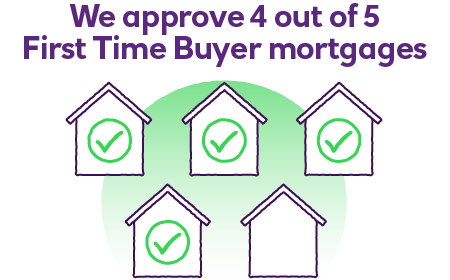Proud partner of Team GB.
Here to help you buy your first home
Step 1: Get an Agreement in Principle
- Get a personalised indication of how much you could borrow in less than 10 minutes.
- It won't impact your credit score.
Step 2: Ready to apply for your new mortgage?
- Apply online today or contact us if you'd like support.
- Save progress and come back whenever you like.
Step-by-step to your first mortgage
Getting a first time buyer mortgage might seem like a fairly complicated process, but there are some general steps you can follow. Here's a helpful first time buyer guide.
Information in the following section is relevant to purchasing property in England, Northern Ireland or Wales, unless stated otherwise. Please note there are differences when purchasing property in Scotland.
-
01
Search for your perfect property
Search the housing market and get an idea of what you are looking for. How many bedrooms do you need? Do you want a garden? What about a garage or off-road parking?Of course, price is important. Our mortgage calculator can give you an understanding of how much you may be able to borrow towards your first home.
-
02
Plan for your deposit
Any mortgage you take out (at least with us) will require you to place a mortgage deposit. This is an amount of money you pay upfront towards the cost of the property.You'll need a deposit of at least 5% of the final sale price (a 95% LTV mortgage) to potentially be eligible for one of our mortgages. However, the higher your deposit as a percentage of the price of the property, the less money you will need to borrow, so you may also want to consider a 90% LTV mortgage (10% deposit) or lower.
Some first time buyers may be able to use a gifted mortgage deposit, from a parent or guardian, for example.
-
03
Get an Agreement in Principle
When you're ready to start viewing properties, it's a good idea to get an Agreement in Principle. This is a free, no obligation, personalised indication of what a bank may be able to lend to you. It can be used with sellers and estate agents to demonstrate that you may be in a financial position to purchase a property. It takes less than 10 minutes and won't impact your credit score.Agreement in Principle
You can find out more about an Agreement in Principle (sometimes known as a Mortgage in Principle or Decision in Principle), what they're for and how you can get one.
-
04
Find your new home and make an offer
When you've found a property you want to buy, make an offer through the estate agent. Remember, the asking price is just what the seller hopes to get - you may be able to negotiate a lower price.
-
05
Prepare what you'll need to apply for your mortgage
There are things you can do ahead of applying to help make the process smoother. Read through our helpful guide about preparing to apply for your mortgage.Also consider the documentation that you will need to have available when you apply.
-
06
Offer accepted? - it's time to apply
Once you have agreed on the price, you can complete your mortgage application.You'll also need to find a conveyancer (solicitor) - a representative who will help you with the process of legal transfer of ownership of the property.
-
07
Valuation and surveys
When you apply for a mortgage, the lender will ask a surveyor to inspect and value the property. This is to ensure it is worth the amount being paid.With NatWest, a standard mortgage valuation will cost between £250 - £1,500 depending on the price of the property, unless we tell you otherwise when you apply.
This is a relatively basic evaluation of the property. You can also choose to request other optional checks and surveys. These will carry a cost but could help uncover any potential hidden issues with the property.
More on house surveys
There are various different surveys you can have on a property, with differing levels of cost and output. It's good to consider these options, as they can provide invaluable information about the property you're looking to buy.
-
08
Exchange and complete
'Exchange' refers to the exchange of contracts between you and the seller's solicitor, with you paying your mortgage deposit. At this point, both parties are bound to the transaction - if you pull out beyond this point, you'll be at risk of losing your deposit.'Completion' is the final stage of the transaction. Your mortgage provider will provide the remaining funds for the purchase (this is called 'drawdown' of the mortgage) to the seller's solicitor. Once this is confirmed, you'll receive the keys and are free to access the property and move in.
Can I take advantage of a first time buyer scheme?
Quite possibly. To help make getting onto the housing ladder easier, the UK government have outlined various home ownership schemes. Not every scheme will be right for everyone, so it's important to consider both pros and cons, to understand what could work for you.
All of these schemes are subject to eligibility criteria for both the borrower and the property being purchased.
Help to Buy: Equity Loan
This scheme allows first time buyers in England buying a new build property to borrow an equity loan from the government to cover part of the cost, so a smaller mortgage is needed.
Shared ownership
With shared ownership, buyers take out a mortgage for a portion of a property and then pay rent on the remaining share.
Over time, they can increase their percentage of ownership and generally, can eventually become the outright owner.
The Mortgage Guarantee Scheme
The scheme provides support from the UK Government for lenders to offer new 91% - 95% mortgages.
What about a Help to Buy ISA?
A 'Help to Buy ISA' is a savings account that includes a government bonus on the money saved, if it is used towards buying a first home. They're no longer open to new applications.
However, if you have an existing NatWest Help to Buy ISA, you can manage it here.
You may however be able to utilise a 'Lifetime ISA'. These savings accounts are still available, and offer a similar bonus benefit to Help to Buy ISAs. These aren't accounts we currently offer at NatWest.
Learn more about lifetime ISAs on the Gov.uk website
Which type of mortgage is best for first time buyers?
- There are different types of mortgage, and mortgage rate, that you could consider. There's no one 'best' type for first time buyers - it will come down to what works best for you.
- You can learn more about mortgage rates, like 'fixed' and 'tracker', as well as different types of mortgage, on our mortgage comparison webpage.
Do first time buyers pay stamp duty?
If you’re a first time buyer, you could get a discount on stamp duty, depending on where in the UK you are buying.
For example, in England and Northern Ireland you won’t need to pay any stamp duty if the house you’re buying costs £300,000 or less.
95% mortgages
A mortgage with as little as a 5% deposit
Saving money for a mortgage deposit can be tricky. Therefore, a good option for buying a property may be a 95% mortgage which allows for a deposit as low as 5%.
Exclusions & eligibility criteria apply. Supported by the UK Government's mortgage guarantee scheme.
Cashback mortgages
£150-£750 cashback on selected mortgages (criteria applies)
If you select a cashback mortgage, we'll give your solicitor £150-£750 cashback on the day you drawdown your mortgage. The amount is dependent upon the products available and the mortgage you apply for.
This offer can be changed or withdrawn at any point. Early repayment charges may apply. Max loan to value (LTV) of 90%.
Green mortgages
Go green and you could save money on your mortgage
Discounted mortgage rates when purchasing an energy efficient home (with a valid Energy Performance Certificate rating of A or B) with a green mortgage.
Available on select products. Product fees may apply.





